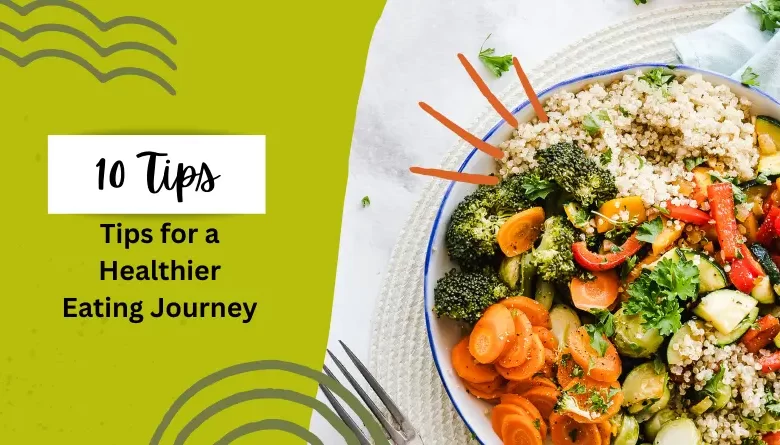10 Practical Tips for a Healthier Eating Journey

In a world dominated by processed foods, adopting a healthier approach to eating can seem challenging but is certainly achievable. Making mindful choices and incorporating simple strategies into your routine can pave the way for a diet focused on whole, nutritious foods. Here, we present 10 realistic ways to guide you in eating less processed food, promoting overall well-being and a more balanced lifestyle.
1.Stock Up on Healthy Snacks:
When time is tight, opting for a convenient packaged snack might seem like the easy choice. However, maintaining a supply of nutritious, on-the-go options in your kitchen makes it simpler to make healthy decisions. Consider having fresh fruit, mixed nuts, edamame, or veggies with hummus readily available. For those with a bit more time, preparing snacks in advance—like hard-boiled eggs, turkey roll-ups, homemade kale chips, or overnight oats—ensures you have wholesome treats at your fingertips.
2.Opt for Whole Grains Over Refined Grains:
A straightforward way to cut down on processed foods is to swap them out for more wholesome alternatives. Instead of refined grains such as white pasta, rice, bread, or tortillas, choose their whole grain counterparts—like brown rice and whole grain pasta, bread, and tortillas. This small adjustment adds nutritional value to your meals and contributes to a healthier overall diet.
3.Unleash Your Culinary Creativity:
Injecting a healthy twist into your favorite processed foods becomes an exciting culinary venture when you take control in your kitchen. Recreating these dishes not only allows you to experiment with new ingredients but also puts you in charge of what lands on your plate.
For instance, transform your regular potato chips by tossing slices of potato, zucchini, turnip, or carrot in a bit of olive oil and salt, then bake until they reach a satisfying crispiness.
Homemade alternatives to processed snacks, such as chia pudding, air-popped popcorn, granola bars, and fruit leather, can be whipped up with ease.
Personally, I find joy in replicating restaurant meals at home instead of opting for takeout. Beyond the cost savings, it makes embracing whole foods—loaded with fruits, veggies, nuts, seeds, and legumes—a more seamless part of my routine.
4.Hydrate with Water:
Swap out sugary beverages like soda, sweet tea, and fruit juice for water throughout the day. This simple switch not only cuts back on processed foods but also enhances your overall dietary choices. If plain water isn’t your preference, consider sparkling or flavored water. Infusing water with fresh fruit or herbs is another delightful way to add a burst of flavor.
5.Embrace Meal Prepping:
Meal prepping, done by preparing large batches of meals weekly, ensures a fridge stocked with nutritious options even on your busiest days. It minimizes the temptation of drive-throughs or frozen convenience meals when time is scarce.
Select a few recipes each week and designate specific times for meal preparation. Opt for recipes that share common ingredients, allowing you to enjoy variety without the monotony of repetitive meals.
6.Boost Veggie Intake:
Enhance the nutritional value of your meals by incorporating at least one serving of vegetables when cooking at home. Simple additions like spinach in scrambled eggs, sautéed broccoli as a side dish, or carrots and cauliflower in soups or casseroles can effortlessly elevate your consumption of wholesome, unprocessed foods.
7.Revamp Your Shopping Habits:
Curbing processed food intake begins with your grocery choices. During your next shopping trip, prioritize filling your cart with healthy, minimally processed options like fruits, vegetables, whole grains, and legumes. Stick to the store’s perimeter, avoiding the central aisles where processed snacks and unhealthy foods are typically displayed. Read product labels diligently, steering clear of items high in sodium, trans fat, or added sugars.
8.Embrace Simple Food Swaps:
Transforming processed products into healthier alternatives is easier than you think. Consider these simple swaps:
•Replace sugary breakfast cereal with a bowl of oatmeal topped with fresh fruit.
•Pop your popcorn on the stove instead of relying on microwave popcorn.
•Craft a homemade vinaigrette using olive oil and vinegar for salads, ditching processed dressings.
•Create trail mix with nuts, seeds, and dried fruit, opting for a wholesome alternative to store-bought varieties.
•Opt for nuts or seeds over croutons as toppings for salads.
9.Cut Back on Processed Meat:
Processed meats like bacon, sausage, lunch meat, and hot dogs come with various drawbacks and are even classified as carcinogenic by the International Agency for Research on Cancer. Fortunately, reducing your intake of processed meat is achievable through simple swaps.
Instead of processed options, choose less processed varieties of meat such as fresh chicken, salmon, or turkey. Replace packaged lunch meats with alternatives like tuna salad, chicken breast, or hard-boiled eggs. Additionally, consider incorporating more plant-based proteins like beans, lentils, tofu, or tempeh into your diet.
10.Embrace Gradual Changes:
Avoid the need for an abrupt elimination of processed foods from your diet. Gradual changes often prove more effective and sustainable. Research suggests that minor lifestyle adjustments lead to long-lasting habits, making initially challenging actions more manageable over time. Experiment with one or two of the strategies listed each week and gradually introduce more changes.
Remember, moderation is key, and you can still enjoy dining out or incorporating processed foods into your diet in moderation as part of a healthy, balanced eating plan.
In Conclusion:
While processed foods are a broad category, including cooked, canned, frozen, or packaged items, it’s essential to limit those high in sodium, sugar, additives, and preservatives. Experiment with the outlined tips to find what suits your lifestyle, and adopt changes gradually for lasting results. Enjoying processed foods in moderation as part of a well-rounded diet ensures balance and a sustainable approach to healthier eating.




